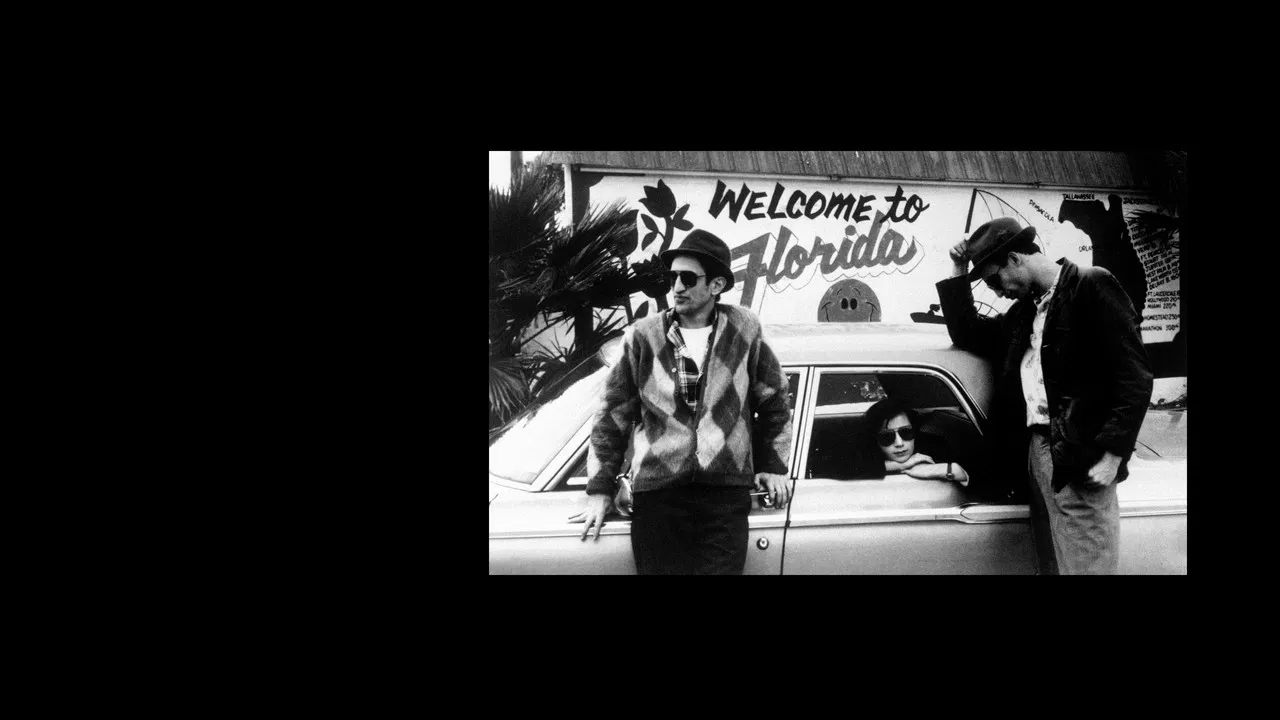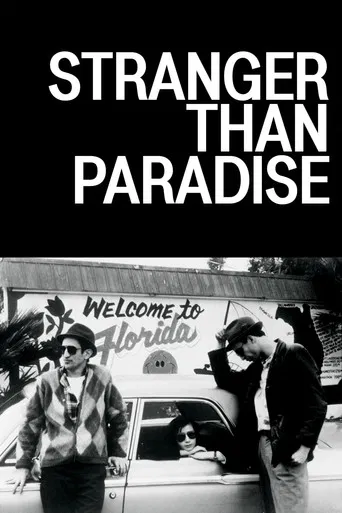

This Movie Can Only Be Described With One Word.
... View Morenot horrible nor great
... View MoreIt is not only a funny movie, but it allows a great amount of joy for anyone who watches it.
... View MoreWhile it doesn't offer any answers, it both thrills and makes you think.
... View MoreA good number of rotten tomatoes for this one but it's so bad it's redeemable and watchable for a second time. The cost of making this film must have been rock bottom. At the end I wish this depressing soap opera continued following the lives of these depressing individuals and their bleak existence. I can see the classic cult appeal to this sad excuse for a motion picture. But I liked it.No sex and almost no bad language. A glimpse into a life of poverty and boredom. A week long trip seeking adventure in dreary Cleveland and traveling to a cheap motel in Florida. I got a good laugh when cousin Eva showed the two dead beats the view of Lake Erie.Suicide Alert - If you're depressed this movie could push you over the edge. :)
... View MoreJim Jarmusch is one of those filmmakers whose films never make the big bucks at the box office, neither does he or his actors win big awards at big ceremonies, nor is he very well known among the masses. But there is a big section of cinema lovers who admire films that are different and distinct from the usual mainstream products that you get at the theaters, and they absolutely love his films, idolise him and get inspired by his work. I belong to the latter category. 'Down By Law' is one of my favourite films of all time. Stranger than Paradise was the first film that made Jarmusch popular in the critics' circles and the film festivals. This film like his others has his distinct style all over it and is a joy to watch.Jarmusch is one of the masters of deadpan comedies. In a very characteristic way, Stranger Than Paradise is a quiet, brooding film where nothing big of mind-blowing magnitude happens. Characters are all very down to earth, casual individuals who get on with their lives without making a big fuss. The flat storyline involves Eva, a Hungarian girl who comes to America and would have stayed with her Aunt Lotte, but due to her illness is forced to stay with her cousin Willie in his apartment in New York. Willie is an archetypal hipster. He has made a conscious effort to relinquish his Hungarian background and identity and accepted the American way of life because he thinks that's cool, he is not social, he spends all of his time in his small, cosy apartment, he eats junk food, plays cards and has no desire to explore the world. When Eva arrives, we can clearly see a wall between the two characters due to their contrasting views of the world, culture and even just plain routines and habits. Although they both find it difficult to adjust to each others' ways, Willie gradually becomes fond of Eva and starts to accept her, while Eva who initially wanted to be friendly with Willie gradually drifts apart due to his demeanour. When Eva leaves to stay with her Aunt, Willie genuinely ends up feeling lonely and becomes quite sceptical about the prospect of having to go back to his lonely life. Eddie is a friend of Willie who acts as a form of a bridge between Willie and Eva. He actually got on with Eva better than Willie. 1 year after Eva's departure, both Willie and Eddie completely fed up and bored with their uneventful lives decide to head to Cleveland where Eva was staying with her aunt. Now a standard film would have shown how Eva makes Willie have a different outlook on the world and change his attitude towards his own life and it would have become a very predictable Hollywood coming of age comedy film. But Jarmusch is anything but standard and predictable. What follows after that is utterly profound and enlightening, but even then it never loses its casual, deadpan style.The central theme of the film I think is the achievement of happiness or fulfillment. People tend to imagine this ideal state that they want to be in and this ideal, heavenly life in paradise that they want to live which leaves them with feelings of dissatisfaction and depression. They tend to chase this life and this dream which they chase throughout their lives, but even when they achieve it, it turns out to be not much different to the lives that they were already leading, just shinier with more material belongings and so there is really no point in chasing anything and genuine fulfillment can't be found. So the film in a way delves a bit in elements of Nihilism. Jarmusch like many other filmmaking auteurs manages to find some optimism in the midst of this pessimism and ends on an optimistic note rather than fashioning and artificially manufacturing a happy ending out of nowhere just for the sake of it.The cinematography of this film reminded me so heavily of French New Wave films of the 1950s and 1960s, specially Godard's 'Masculin Féminin'. There is very little editing. Jarmusch uses these long shots and allows the camera to stay still and focus on the characters. It is extremely understated and the whole film depends and revolves around the mood that Jarmusch creates. This film can be aptly described as a moody, hypnotic comedy. Very little happens on screen, but everything gets revealed through little glances that the actors use and soft, short lines spoken by characters and the visuals. The acting by the three major actors namely John Lurie, Eszter Balint and Richard Edson (who reminded me of Robert de Niro as Johnny Boy in 'Mean Streets') is understated, nuanced, but very effective for a film of this style. Stranger Than Paradise is certainly not a film for everyone. People who expect fast paced films where a lot of things happen will feel infinitely disappointed with this. But I love directors who make no compromise with their films and stay true to their art and style. Stranger Than Paradise is a deep and meaningful film that demands patience and attention from the viewers. It had a huge impact on the American Independent Film scene and for this it deserves even more praise, specially considering that it got released at a time during which Americans could see nothing other than Star Wars, Indiana Jones and other big budget studio bonanzas. It gave promise and hope to budding filmmakers in America that they could also make films of a different variety and not give in to the pressures of the studios and the Box Office.
... View MoreMy circle of friends has been saying "I am de vinner..." since we first saw this film in the '80s."Stranger than Paradise" was Jarmusch's first film, based on a short film, and I've been a fan ever since.John Lurie is Willie, who has been living in New York City and thinks he's really got it going on in his drab apartment and TV dinners. He is surprised -- and not very happy -- when his cousin Eva shows up from Hungary for a visit. He doesn't want anything to do with the Hungarian language or the old country.Willie is pretty hostile in the beginning, but he and his friend Eddie (Richard Edson) take her along with them (though they continually try to ditch her) on their big road trip, which starts at Aunt Lotte's (Cecillia Stark) house in Cleveland. There they play cards with Aunt Lotte declaring herself "de vinner." Then it's on to Florida, and here's where the story develops a couple of neat twists.This film was made for $90,000 and is considered incredibly successful as it earned something like 20+ times its budget. The photography is stark in black and white and the locations finally elicit an hysterical observation from Eva."Stranger than Paradise" has quirky comedy and a quirky outlook, typical of Jarmusch. There's an underlying feeling of quiet loneliness throughout as the three misfits look, but don't seem to know what they're looking for. The film is set in the '80s, both Willie and Eva don't dress like it, and seem to fit in well with Aunt Lotte's old-fashioned European decor.Though Jarmusch's characters are often a little wacky, you can't help but like them or empathize with them. The story and characters of "Stranger Than Paradise" are oddly unforgettable as Eva looks at America and thinks, so what? And given what she sees, you can't blame her.
... View MoreThis cool to distraction cult favorite introduced art house audiences to the minimalism of writer director Jim Jarmusch, who in his breakthrough feature walks a fine line between tedium and hilarity. Mix the two together and the result is a unique if lukewarm comedy exploring American culture at its lowest common denominator, resembling a lonely little travelogue of cheap motel rooms and TV dinners. The trio of unlikely protagonists: a listless New York City non-entity (Lounge Lizards saxophonist John Lurie), his dimwitted but amiable friend, and a demure Hungarian cousin, detour from the Big Apple to Cleveland to Florida, but while the landscapes never change the film is not as pointless as it appears. The rigid construction, with each self-contained scene blacking out before the next, adds up (curiously) to something more than the sum of its loosely fitted parts, and once adjusted to the halting pace viewers will discover an offbeat alternative to conventional storytelling techniques.
... View More